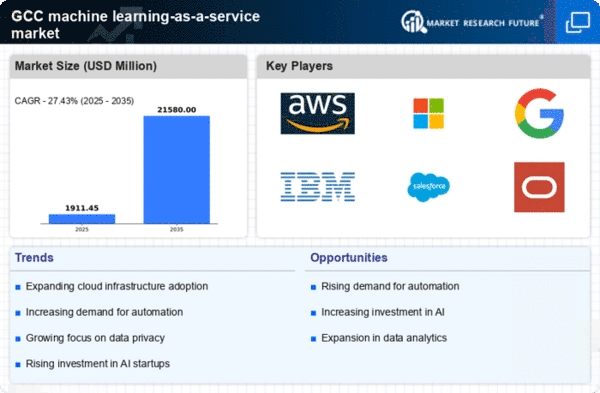Rising Demand for Data Analytics
The machine learning-as-a-service market is experiencing a notable surge in demand for data analytics solutions across various sectors in the GCC. Organizations are increasingly recognizing the value of data-driven decision-making, which is propelling the adoption of machine learning services. According to recent estimates, the data analytics market in the GCC is projected to grow at a CAGR of approximately 25% over the next five years. This growth is largely attributed to the need for businesses to enhance operational efficiency and gain competitive advantages. As companies seek to leverage vast amounts of data, the machine learning-as-a-service market is positioned to play a crucial role in providing scalable and efficient analytics solutions. Consequently, this driver is likely to foster innovation and investment in machine learning technologies within the region.
Government Initiatives and Support
Government initiatives in the GCC are significantly influencing the machine learning-as-a-service market. Various national strategies aim to promote digital transformation and innovation, which includes the integration of machine learning technologies. For instance, the UAE's National Artificial Intelligence Strategy 2031 aims to position the country as a leader in AI by fostering research and development. Such initiatives not only provide funding and resources but also create a conducive environment for startups and established companies to explore machine learning solutions. The support from government bodies is expected to enhance the adoption of machine learning-as-a-service offerings, thereby accelerating market growth. This driver indicates a strong alignment between public policy and technological advancement in the region.
Growing Focus on Customer Experience
Enhancing customer experience is becoming a pivotal focus for businesses in the GCC, thereby driving the machine learning-as-a-service market. Companies are increasingly utilizing machine learning algorithms to analyze customer behavior and preferences, enabling them to deliver personalized services. This trend is particularly evident in sectors such as retail and banking, where customer satisfaction is paramount. By leveraging machine learning, organizations can optimize their offerings and improve engagement, which is likely to result in higher customer retention rates. As businesses continue to prioritize customer-centric strategies, the demand for machine learning solutions that facilitate these objectives is expected to grow, further propelling the market.
Emergence of Advanced Analytics Solutions
The emergence of advanced analytics solutions is reshaping the landscape of the machine learning-as-a-service market in the GCC. Organizations are increasingly seeking sophisticated tools that can provide deeper insights and predictive capabilities. This shift is driven by the need to stay competitive in a rapidly evolving market. Advanced analytics, powered by machine learning, enables businesses to uncover hidden patterns and trends within their data, leading to more informed decision-making. As a result, the demand for machine learning services that offer these advanced capabilities is likely to rise. This driver suggests a growing sophistication in the analytics needs of businesses, which the machine learning-as-a-service market is well-positioned to address.
Increased Investment in Cloud Infrastructure
The machine learning-as-a-service market is benefiting from increased investment in cloud infrastructure across the GCC. As organizations migrate to cloud-based solutions, the demand for machine learning services hosted on these platforms is rising. Recent reports suggest that cloud spending in the GCC is anticipated to reach $10 billion by 2025, driven by the need for scalable and flexible computing resources. This trend is likely to facilitate the deployment of machine learning models, enabling businesses to harness advanced analytics without the burden of maintaining on-premises hardware. The synergy between cloud infrastructure and machine learning services is expected to enhance operational capabilities and drive innovation in the market.
















